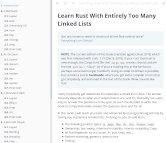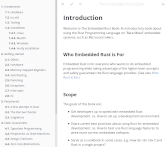Last Updated on June 14, 2023
6. A Gentle Introduction To Rust by Steve J Donovan
 The aim of this tutorial is to take you to a place where you can read and write enough Rust to fully appreciate the various learning resources available online.
The aim of this tutorial is to take you to a place where you can read and write enough Rust to fully appreciate the various learning resources available online.
The book covers a fairly wide range of material including structs, enums and matching, filesystem and processes, modules and Cargo. It then provides material on standard library containers, error handling, threads, networking and sharing. The final chapters cover object-oriented programming, parsing with Nom, and areas of Ruby that can cause issues.
The book is published under the MIT license.
7. Rust for Rubyists by Steve Klabnik
 This was the author’s first community tutorial for Rust. He since moved on to improving the official documentation and The Rust Programming Language.
This was the author’s first community tutorial for Rust. He since moved on to improving the official documentation and The Rust Programming Language.
Rust for Rubyists is an introductory text.
There’s also a GitHub code repository available at https://github.com/steveklabnik/rust_for_rubyists.
8. Learn Rust With Entirely Too Many Linked Lists by Alexis Beingessner
 Learn Rust With Entirely Too Many Linked Lists teaches you basic and advanced Rust programming entirely by having you implement 6 linked lists.
Learn Rust With Entirely Too Many Linked Lists teaches you basic and advanced Rust programming entirely by having you implement 6 linked lists.
- The following pointer types:
&,&mut,Box,Rc,Arc,*const,*mut. - Ownership, borrowing, inherited mutability, interior mutability, Copy.
- All The Keywords: struct, enum, fn, pub, impl, use, …
- Pattern matching, generics, destructors.
- Testing.
- Basic Unsafe Rust.
This book is published under the MIT license.
9. The Embedded Rust Book by Jorge Aparicio, James Munns, and others
 The Embedded Rust Book: An introductory book about using the Rust Programming Language on “Bare Metal” embedded systems, such as Microcontrollers.
The Embedded Rust Book: An introductory book about using the Rust Programming Language on “Bare Metal” embedded systems, such as Microcontrollers.
Embedded Rust is for everyone who wants to do embedded programming while taking advantage of the higher-level concepts and safety guarantees the Rust language provides.
This book tries to be as general as possible but to make things easier for both the readers and the writers it uses the ARM Cortex-M architecture in all its examples. However, the book doesn’t assume that the reader is familiar with this particular architecture and explains details particular to this architecture where required.
This book caters towards people with either some embedded background or some Rust background, however we believe everybody curious about embedded Rust programming can get something out of this book.
The code samples and free-standing Cargo projects contained within this book are licensed under the terms of both the MIT License and the Apache License v2.0. The written prose contained within this book is licensed under the terms of the Creative Commons CC-BY-SA v4.0 license.
Pages in this article:
Page 1 – The Rust Programming Language and more books
Page 2 – Why Rust? and more books
All books in this series:
| Free Programming Books | |
|---|---|
| Ada | ALGOL-like programming language, extended from Pascal and other languages |
| Agda | Dependently typed functional language based on intuitionistic Type Theory |
| Arduino | Inexpensive, flexible, open source microcontroller platform |
| Assembly | As close to writing machine code without writing in pure hexadecimal |
| Awk | Versatile language designed for pattern scanning and processing language |
| Bash | Shell and command language; popular both as a shell and a scripting language |
| BASIC | Beginner’s All-purpose Symbolic Instruction Code |
| C | General-purpose, procedural, portable, high-level language |
| C++ | General-purpose, portable, free-form, multi-paradigm language |
| C# | Combines the power and flexibility of C++ with the simplicity of Visual Basic |
| Clojure | Dialect of the Lisp programming language |
| ClojureScript | Compiler for Clojure that targets JavaScript |
| COBOL | Common Business-Oriented Language |
| CoffeeScript | Transcompiles into JavaScript inspired by Ruby, Python and Haskell |
| Coq | Dependently typed language similar to Agda, Idris, F* and others |
| Crystal | General-purpose, concurrent, multi-paradigm, object-oriented language |
| CSS | CSS (Cascading Style Sheets) specifies a web page’s appearance |
| D | General-purpose systems programming language with a C-like syntax |
| Dart | Client-optimized language for fast apps on multiple platforms |
| Dylan | Multi-paradigm language supporting functional and object-oriented coding |
| ECMAScript | Best known as the language embedded in web browsers |
| Eiffel | Object-oriented language designed by Bertrand Meyer |
| Elixir | Relatively new functional language running on the Erlang virtual machine |
| Erlang | General-purpose, concurrent, declarative, functional language |
| F# | Uses functional, imperative, and object-oriented programming methods |
| Factor | Dynamic stack-based programming language |
| Forth | Imperative stack-based programming language |
| Fortran | The first high-level language, using the first compiler |
| Go | Compiled, statically typed programming language |
| Groovy | Powerful, optionally typed and dynamic language |
| Haskell | Standardized, general-purpose, polymorphically, statically typed language |
| HTML | HyperText Markup Language |
| Icon | Wide variety of features for processing and presenting symbolic data |
| J | Array programming language based primarily on APL |
| Java | General-purpose, concurrent, class-based, object-oriented, high-level language |
| JavaScript | Interpreted, prototype-based, scripting language |
| Julia | High-level, high-performance language for technical computing |
| Kotlin | More modern version of Java |
| LabVIEW | Designed to enable domain experts to build power systems quickly |
| LaTeX | Professional document preparation system and document markup language |
| Lisp | Unique features - excellent to study programming constructs |
| Logo | Dialect of Lisp that features interactivity, modularity, extensibility |
| Lua | Designed as an embeddable scripting language |
| Markdown | Plain text formatting syntax designed to be easy-to-read and easy-to-write |
| Objective-C | Object-oriented language that adds Smalltalk-style messaging to C |
| OCaml | The main implementation of the Caml language |
| Pascal | Imperative and procedural language designed in the late 1960s |
| Perl | High-level, general-purpose, interpreted, scripting, dynamic language |
| PHP | PHP has been at the helm of the web for many years |
| PostScript | Interpreted, stack-based and Turing complete language |
| Prolog | A general purpose, declarative, logic programming language |
| PureScript | Small strongly, statically typed language compiling to JavaScript |
| Python | General-purpose, structured, powerful language |
| QML | Hierarchical declarative language for user interface layout - JSON-like syntax |
| R | De facto standard among statisticians and data analysts |
| Racket | General-purpose, object-oriented, multi-paradigm, functional language |
| Raku | Member of the Perl family of programming languages |
| Ruby | General purpose, scripting, structured, flexible, fully object-oriented language |
| Rust | Ideal for systems, embedded, and other performance critical code |
| Scala | Modern, object-functional, multi-paradigm, Java-based language |
| Scheme | A general-purpose, functional language descended from Lisp and Algol |
| Scratch | Visual programming language designed for 8-16 year-old children |
| SQL | Access and manipulate data held in a relational database management system |
| Standard ML | General-purpose functional language characterized as "Lisp with types" |
| Swift | Powerful and intuitive general-purpose programming language |
| Tcl | Dynamic language based on concepts of Lisp, C, and Unix shells |
| TeX | Markup and programming language - create professional quality typeset text |
| TypeScript | Strict syntactical superset of JavaScript adding optional static typing |
| Vala | Object-oriented language, syntactically similar to C# |
| VHDL | Hardware description language used in electronic design automation |
| VimL | Powerful scripting language of the Vim editor |
| XML | Rules for defining semantic tags describing structure ad meaning |
